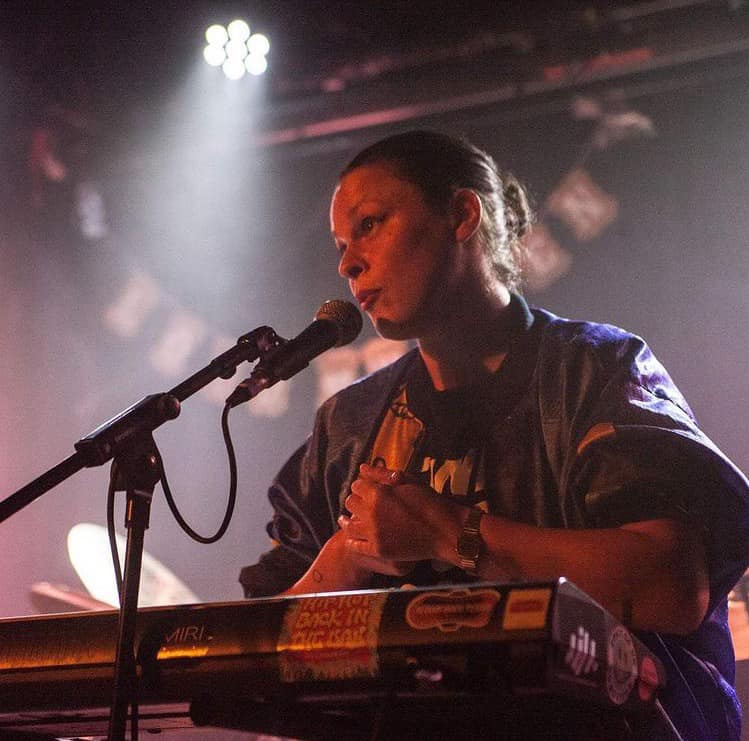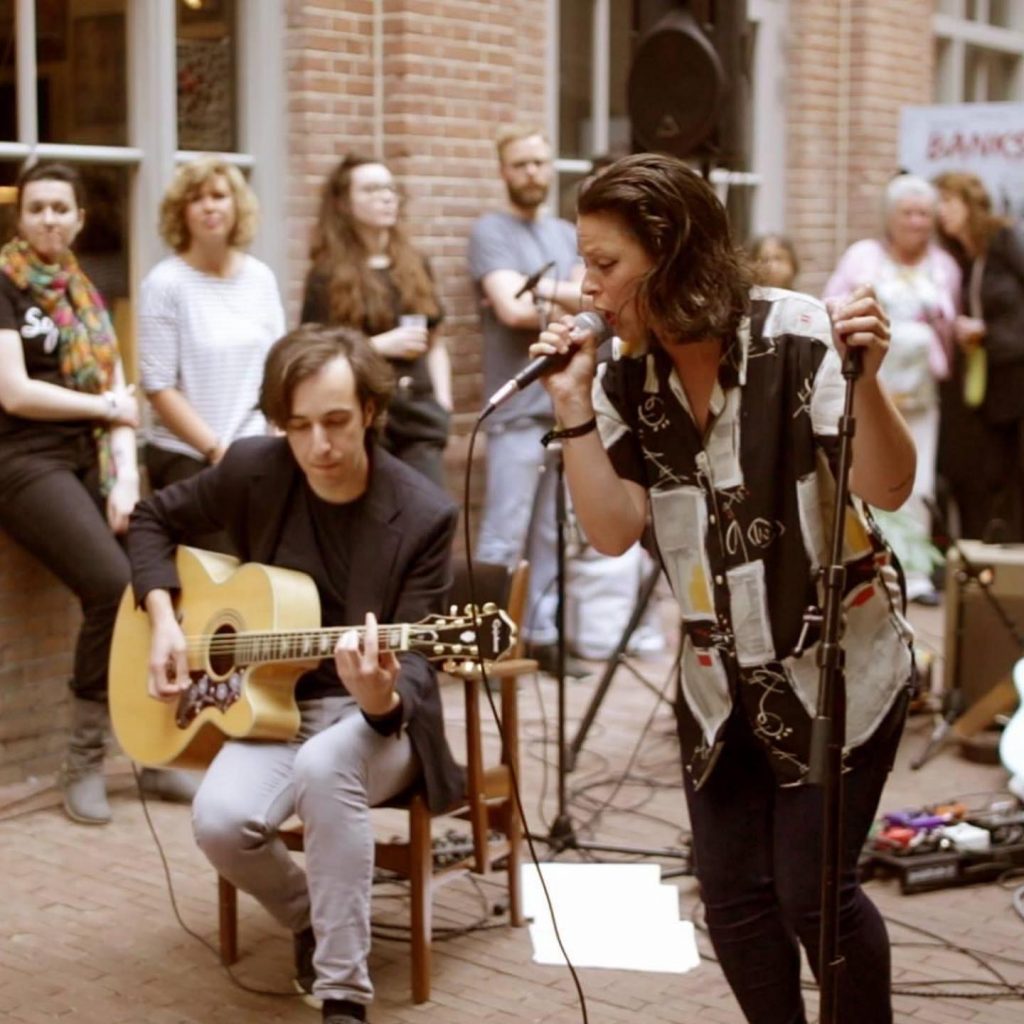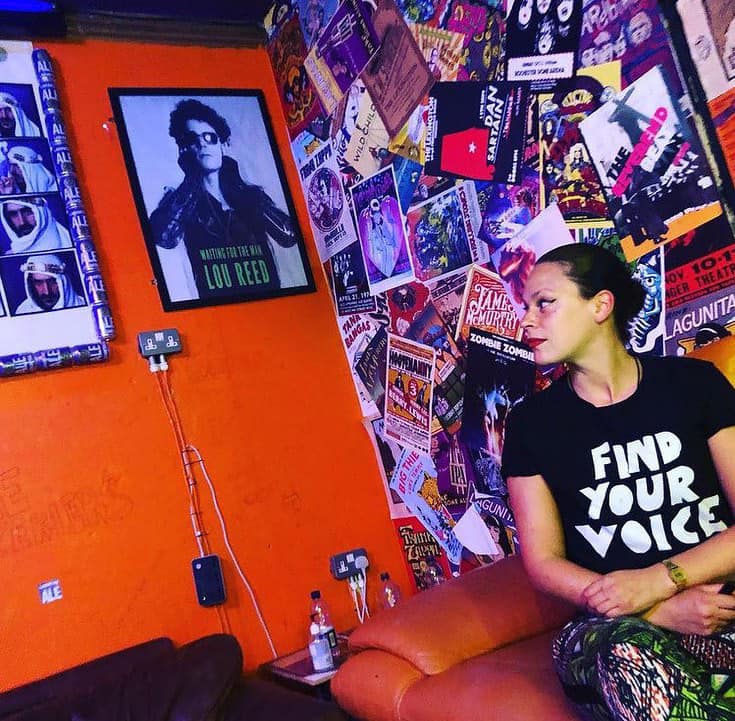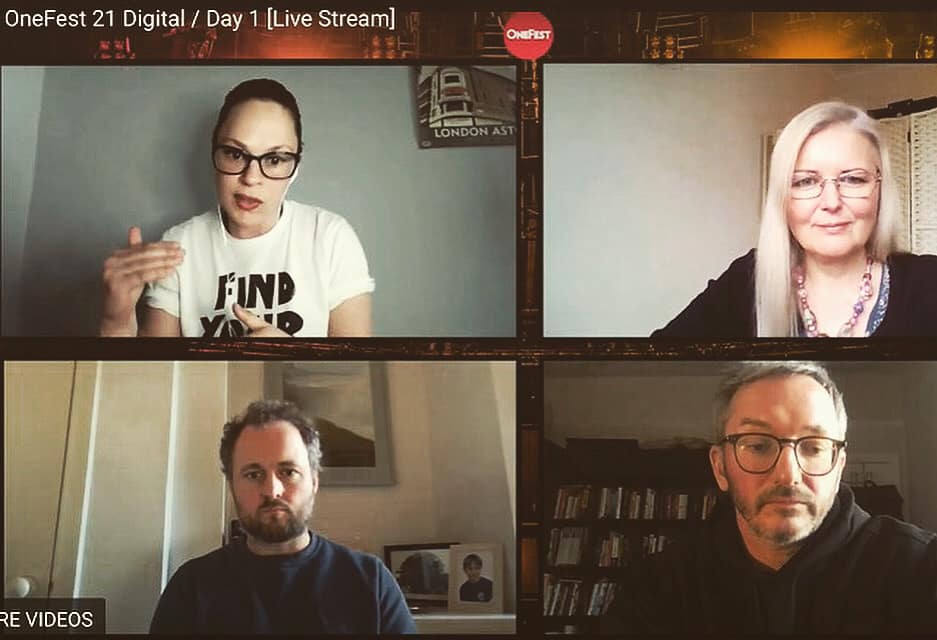In the unassuming presence of our latest guest, it is hard to envisage some of the dizzy heights she has achieved as an independent music artist.
As well as receiving radio play from BBC 6 Music, Soho Radio, BBC Introducing and Radio X, her music has also featured in a number of independent films, including (2014) British film ‘Fear of Water’ (International Women’s Film Festival L.A.). She has co-written and worked with Estelle, Plan B and Xylaroo whilst racking up touring credentials that span the U.K. and Europe. Having played countless headline shows and international festivals, her career has also seen her supporting the likes of Rita Ora (Manchester Pride) and Laura Viers (Bush Hall).
As part of an exclusive selection of Pride Season Specials (2021), The Giant Peach catches up with soulful pop singer/songwriter MIRI. Taking a look back over the last 20 years of her music career, MIRI defines what it is to be a queer woman in music today whilst reminiscing over some of the highlights and challenges she has faced along the way.
“I’m grateful to still be here and to be living my truth. But I feel like, where I am now, I would’ve been here 10 years ago if I’d been able to come out sooner.”
MIRI

What has it been like carving a niche in music whilst presenting yourself authentically as an LGBTQIA+ person?
Well, nowadays, I can comfortably say that I identify as a queer woman with pronouns she/her. But when I first started out, I hadn’t dealt with my sexuality at all and for many years I was using music to fill that void where I didn’t feel heard. I mean, I grew up in a time when section 28 was still in place, so you couldn’t even get any support at school, from teachers, books, nothing. The first time I sort of ‘came out’ was in my early twenties and I didn’t go out on the queer scene in London until a few years later.
I remember being signed to this management in the beginning. We were in the studio and I’d written a song about this girl. I hadn’t properly come out to myself at that point, but I knew I had these feelings that were unrequited. I obviously hadn’t expressed them to her either, so I was just feeling all these emotions in such a magnified way. I remember the guys in the studio were saying things like, ‘Think about how you’re feeling for him right now’, and all this stuff, to get me to do my best take. And in my heart, I’m screaming ‘It’s a her! It’s about a woman!’ It was so uncomfortable.
But, back then, you had to sign to a label to release music, there wasn’t the opportunity for self-releasing that we have now. So, at the time, I had to just put my head down, my focus was my music, it was everything to me and I thought that doing whatever I needed to do to get there was gonna make me happy. In the end, I was very close to being signed to a major label but, looking back, even though it broke my heart when it didn’t happen, I think it was actually for the best.
Why do you think it wouldn’t have worked out?
Cuz I hadn’t come out and I didn’t know who I was. To have gone through that whole process whilst signed to a major, especially in those times, I think it would’ve been terrible for my mental health. I thought I knew who I was cuz I was being who society and those close to me believed I should be, and they really validated that person. But the truth is, even the people who thought they knew me well, they never did because they didn’t know that I was queer.
If I’d had the freedom to date girls in my teens, I’m sure it would’ve made such a difference to the next 20 years of my life – hiding yourself really stunts your development, I think. I’m very grateful to still be here and to be living my truth. But I feel like, where I am now, I would’ve been here maybe 10 years ago if I’d been able to come out sooner.
MIRI’s work is without doubt some of the best alternative pop music the U.K. has to offer. Her latest E.P. release, ‘Soundbites’ (2019), certainly encapsulates the sweet, classic tone of her past records. Submerged in a vintage London-inspired grit, the production is beautifully blended with her slick songwriting as it showcases the subtle depth of her sublime vocals. Recent single release, ‘Just Breathe’ (2020), captures the heart of her ability to resonate with listeners through her unique authenticity, while my personal favourite, ‘Red’ (2013), effortlessly stands up against the songwriting mastery of Ed Sheeran, Adele or the late Amy Winehouse.
But aside from her own musical endeavours, MIRI is also an active member of the London music scene from the ground up. She is involved with many projects and organisations that help young artists and marginalised groups to find a sense of empowerment through music and creativity.
“I just feel like so many things in this world are showing us that we need to be like this thing or like that. Why not just nurture what we already have?”
MIRI

How did your latest project ‘Find Your Voice’ come about?
For a long time, I’ve offered one-to-one vocal sessions. Mostly working on building confidence because that’s something I know many creatives struggle with, myself included. About 2 years ago I decided to put these sessions and workshops under the umbrella title: Find Your Voice – because that’s what I do. I’m not here to give someone opera training or get them to stretch their voice around a musical theatre score. But it’s important to me, whether it’s through my music or through the work I do with young people and mental health organisations, to support and empower people – to give them a platform to be who they are and provide that love and encouragement in a safe space. I like to use my knowledge and experience to encourage people to find that truth, cuz that’s what our voice is!
So many people say, ‘I don’t sound like this person or that person’ and I’m like, ‘You don’t have to, cuz you’re you.’ Every approach is slightly different, but I’m a strong believer in the idea that the singing voice should ideally sound pretty close to your speaking voice. You know, if I’m talking to you like this and then I start singing like some big diva, it wouldn’t really be me, it would just be me imitating someone else. If that’s who I wanna be then that’s okay too, but I just feel like so many things in this world are showing us that we need to be like this thing or that thing. Why not just nurture what we already have?
I do cover some basic exercises and techniques to help improve vocal stamina and get the most out of each voice stylistically, but it’s not just a case of singing everything perfectly, it’s a more holistic approach.
How has empowering others influenced you as an artist?
Well, my life looks very different to what I expected it to be as a kid. But I feel that everything I’ve gone through, from the knock backs to the successes to the work I’ve done with young people and mental health organisations, it’s all really fed into everything I do. It’s actually helped me to become a better artist, I think.
Running a music session in a mental health unit, for example, you obviously can’t have physical contact, like giving someone a hug or shaking someone’s hand – you’re relying purely on the music and the energy. That really strengthens you as a performer, cuz you’re always having to find ways to allow who you are and what you’re sharing to resonate.
I’ve also performed my music in male prisons, along with doing Q&As about music and LGBTQIA+ topics. I remember the last prison I performed in; the gig was in this little chapel thing. I just remember saying at the start, ‘Look, I don’t expect you all to like what I do but I’m just here sharing my artistry.’ After that, I immediately felt the tension disappear. It really helped me take control of the situation. I mean, whatever the scenario, you have to find your audience. At a Festival, for example, there might be a lot of people there but nobody who’s there specifically to see you. It can be hard to find that connection. But the more live situations you find yourself in, the more opportunities you have to grow and learn more about how you can communicate your art. I really do value and appreciate each and every moment very equally.
There is certainly a dream-like quality to MIRI’s temperament which is reflected in her music. Having arranged to call me via Zoom from her East London apartment, she walks around freely as we speak – unintentionally giving me the grand tour. I cannot help but notice a vibrant blue colour emanating from one of the walls, bringing a tranquil glow to my screen.
‘My dream is to live by the sea’, she says in a wistful response to my pointing it out. ‘Perhaps with the rate of climate change it’ll happen sooner than I expected, and I won’t even have to leave London’, she jokes. ‘But realistically, with all my commitments, I’m not gonna be moving to Brighton anytime soon so I just thought, why not create that environment for myself here instead of waiting.’
‘Perhaps I can get my friends to stand outside and make whooshing noises, so it feels more realistic’, she says with a tongue in cheek sense of humour. As I take the bait, I express my concern for when she wins her first Grammy, in relation to the infamous dressing room demands of artists like Madonna and Mariah Carey. But, in true MIRI style, she reassures me with a humble sincerity, ‘I promise, if that ever happens and I’m ever lucky enough to be in that position, I will not make those demands.’
“There’s no head at a label or management saying, ‘Right, today you’ve gotta talk about your sexuality.’ It’s who I am. It doesn’t mean I can’t or won’t play to straight audiences”
MIRI

Have there been challenges to overcome as an artist since opening up about your sexuality?
Yeah definitely. I actually applied for some funding recently to record new music, which I didn’t get. Any artist who’s ever applied for funding knows this process very well (laughs). But anyway, there was a day where you could call up and get feedback on your application.
I spoke to someone over the phone who hadn’t done the assessment themselves, but they were just reading the notes, you know. Some of the stuff they said, I was like, ‘Okay, fair enough.’ But then there was this one comment that said something like, ‘We’re not sure if she wants to break out of the LGBTQIA+ community.’ Regardless of what was behind that, it actually really upset me. It just didn’t sit right, for me, as any kind of valid reason.
I’ve been doing music for years and I perform at many different spaces. Sure, as I’ve continued to find myself, I’ve spoken out on LGBTQIA+ topics and my own experiences. But, you know, that’s just me living my life. I don’t go into shops and say, ‘Hi, can I have one of those? I’m queer by the way.’ There’s no head at a label or management saying, ‘Right, today you’ve gotta talk about your sexuality.’ It’s who I am. It doesn’t mean I can’t or won’t play to straight audiences. I shouldn’t even have to say this!
But it’s a very small-minded way of looking at things that, unfortunately, regardless of the context of that comment, cuts deep because it is extremely prevalent, it is the world we’re living in, and it is reflected in the music industry today. They’ll tend to want a queer woman, but on their terms. It’s like, ‘We like you, but we only want you if you do music like this or you look like that.’ And being a queer person there’s definitely a theme of feeling that you’re not really wanted or you’re not really good enough, so it’s hard not to play into the expectation, I think.
The music industry is a bit like that popular gang at school, the family members, the ex’s or the unrequited loves that you just wanted so badly to love you. This can be quite toxic for LGBTQIA+ people. Sometimes I just think, why do I even seek that validation when I already have a wonderful group of people over here, hearing and seeing me loud and clear.
Do you find there is a more authentic connection with LGBTQIA+ audiences?
There’s definitely a stronger sense of loyalty. I had some songs featured in a film a few years back which featured an actress who’d recently played a lesbian character in Skins. She had a big following of gay/bi/queer women, and because I’d had three songs featured in that film, some of her fans ended up finding me through social media.
There was one who messaged me on twitter and told me that they’d come out to their mum. I was so proud that just doing what I do had had such an effect on somebody. Regardless of whether I’ve got 100 followers or a million, you know, just me making music had reached out to this person and helped them in one of the most important turning points of their life. That’s a strong connection that never breaks.
“I think change only happens when you give people a seat at the table. If you haven’t got people who represent you at the top then, unless you’ve got someone up there who’s very passionate about the cause, it doesn’t really tip the balance.”
MIRI

Would you say there is more diversity on the live circuit than in mainstream music releases?
Not really. There’s still a long way to go. I’m a social media ambassador for The F List, which is a wonderful U.K. directory of female and gender non-conforming artists and musicians. Vick Bain, the founder, is amazing. She was chairing a panel discussion recently for One Fest which I was invited to speak at. It was such a positive experience; they were all really committed to achieving more diversity in their line ups. Then, a few weeks later, we saw all these other festivals being announced and it was all basically white cis men playing.
I read recently that at Reading and Leeds, Billie Eilish had drawn the biggest crowd. I feel there’s sometimes this idea that if you have a female artist on, she won’t provoke the same enthusiasm from the crowd, which is clearly not true. But if you’re not giving performers a chance then how can they find their audience in the first place? How can their audience find them? How are women or anyone else who’s going to these festivals meant to be represented? All it does is put across a message that other groups of people are less valued. It’s really important that we have that visibility.
There’s a great organisation called Keychange which works with festivals to achieve that gender balance. From what I’ve seen, the festivals who’ve committed to it are doing great! Some of them sold out! One of the founders said that they did some research on the ground and festival goers themselves were actually saying it – girls and young women had been expressing that they wanted to see more female performers. But it’s a bit of a hamster wheel, this argument literally happens every year.
Do you think we need more organisations like this to make a real difference?
The thing is there’re so many. But, I think, if you still have the same infrastructure in the industry, it doesn’t really make much difference, unfortunately. That’s not to say we shouldn’t be trying, but I think change only happens when you give people a seat at the table. If you haven’t got people who represent you at the top, then unless you’ve got someone up there who’s very passionate about the cause, it doesn’t really tip the balance.
Having said that, we won’t get there without a fight and there’re now so many amazing D.I.Y. movements. I was involved in a single that the founder of Loud Women Cassie Fox wrote called ‘Reclaim These Streets’. All that money went to Women’s Aid U.K. It was a massive project, we had Brix Smith on there doing some spoken word – I was one of about 60 voices on that record! Loud Women are also doing a festival in September which has been funded by the Arts Council – I’ll be performing there too. So yeah, there’re many organisations that are definitely doing incredible things, but I also think the bottom line is that, in the end, there will need to be queer people who have a seat at the table and a voice in the conversation for queer artists to have a chance at getting their moment in the mainstream.
What advice would you give young LGBTQIA+ people starting out in the music industry?
I think, at the start, don’t feel like you need a team. It strengthens you as a person and as a creative to do it yourself before you have people investing in you. Eventually you’ll need it, it definitely takes the edge off when you have that bit of a push – a PR campaign or a publisher who believes in what you’re doing.
But it’s good to prove that what you’re doing stands up on its own first. Obviously, the dream is just to have that creative space and other people doing the practical jobs. But be proactive, speak to your manager or your booking agent, stay involved. At least have that knowledge and understanding of what’s going on around you, otherwise there’re so many people out there who’ll happily rip you off.
And always be humble, whether you’re on a big TV show in the States or you’re performing at your local chippy (laughs), just always remain humble. It’s something I often see, you know, people get a bit of attention, they start getting that recognition and they can really change. We’re all trying our best but, if you can, whether you’re accepting that Grammy or self-releasing, always be kind and humble to the people that are kind to you.
Links
Featured image by Keira Anee: Keira Anee Photography
Find MIRI on Instagram: @miriofficialuk or at www.miriofficial.com



